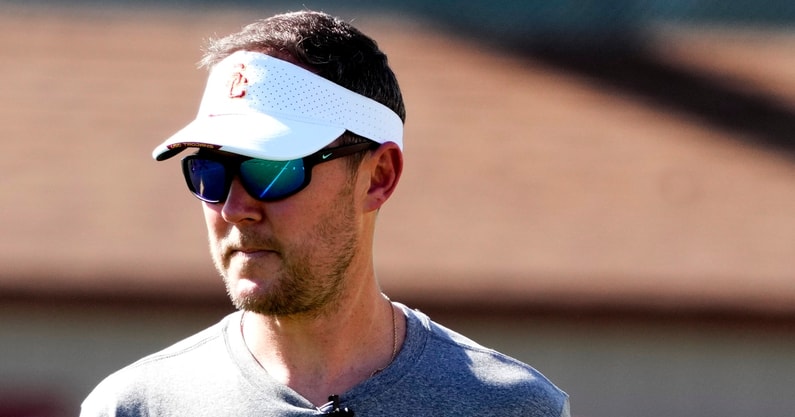Lincoln Riley: NIL ‘completely changed’ college football recruiting

Ever since the Supreme Court and the NCAA opened the door for student-athletes to be paid for their Name, Image and Likeness, USC head coach Lincoln Riley said the recruiting trail doesn’t look anything like it has in the past.
“It’s completely changed,” Riley said when speaking with reporters Saturday. “It doesn’t even resemble what we used to do before. In every sense of the word, it’s different.”
Going back to his time as the head coach at Oklahoma, Riley has supported college student-athletes getting paid off NIL. But he’s been a critic of the consequences that could arise when NIL was officially greenlit by the NCAA last summer.
“We got hung out to dry with all these rules,” Riley said at Big 12 media day last summer. “They are literally telling us what the rules are a day before we announce this thing, which is insane. It is what it is, and we made the most of it. But I think it was more trying to understand our state laws, our policies, the university policy which does mirror our state law, how that’s going to come into play, how we have to adapt, the role that we can have, the role that we can’t have.”
Lincoln Riley knew NIL would ‘seep into recruiting’
One of the areas that concerned Riley – and other head coaches across the country – was the impact NIL would have on the recruiting trail.
“Our reality is that it’s made what’s going on at certain places for a long time, it’s kind of put it out in the open,” Riley said. “I’m a fan of guys being able to capitalize off their NIL. But there was no doubt it was going to seep into recruiting at some point. I think anybody that cares about college football is not real pleased with that.”
That’s especially true after The Athletic detailed how one unnamed five-star prospect in the Class of 2023 signed a contract with an unnamed school’s collective that could pay him more than $8 million by his junior year of college. School-specific collectives typically pool funds from boosters to help the school’s athletes monetize their brands. Industry sources expect every Power 5 school to be affiliated with at least one NIL-related collective in a few months.
The deal with the five-star recruit was just one example of an escalating arms race — one that’s been ongoing for months — among the most ambitious, most aggressive collectives to pool millions of dollars from boosters in hopes of signing celebrated recruiting classes.
Top 10
- 1New
Johntay Cook
Headed to ACC
- 2Hot
Fan who fell from stands
20-year old former CFB player
- 3Trending
Donald Trump
Wants Saban back as Alabama HC
- 4
Kentucky, St. John's
Set to play in 2025-26
- 5
Bracketology
Way Too Early Tournament projection
Get the On3 Top 10 to your inbox every morning
By clicking "Subscribe to Newsletter", I agree to On3's Privacy Notice, Terms, and use of my personal information described therein.
It’s essentially pay-for-play. And it’s a new world that doesn’t impress Lincoln Riley one bit.
“That wasn’t the intention,” Riley said. “A lot of people voiced concerns when NIL came up and that there had to be a plan for that. And instead, we instituted NIL without any plan.”
He’s not the only one that is upset with the current state of recruiting with the NIL.
“I’m 100% for NIL,” an SEC recruiting coordinator told On3. “I also know that you have to present what your athletes are getting and how you support them with education but taxes/investments, etc. But this is too far. It’s the exact thing that has always got you the death penalty and coaches show clauses. Hell, people in basketball are in jail right now for similar but different circumstances.
“The two ‘absolutely not’ things you have always been scared to do because you know when you are caught you are done, as a coach, head coach, athletic director, and even donor is pay for play and donors being involved with your recruits. But here we are.”
Riley hopes there is a market correction
There are currently 28 states, including California, that have laws providing student-athletes with the right to profit of their NIL. In addition, 16 states are considering new NIL legislation. Yet, there are zero regulations from the NCA that would prohibit star high school players from brokering deals with boosters with the intent to sign with their program.
“I’m sure at some point that there’s going to be a market correction, if you will, with recruiting,” Lincoln Riley said. “Hopefully there will be because in a perfect world, they stay separate. High school kid — his family, their state, whatever — if they have a NIL opportunity, that’s great. College athletes, if they have a NIL opportunity, fantastic. I want them to do super well.
“It shouldn’t cross over and but unfortunately with the way the rules are set up, it has crossed over. It’s crossing over a lot right now and it’s totally changed recruiting.”